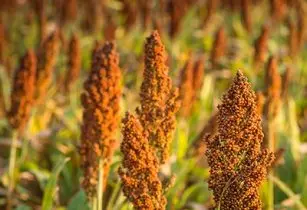In the diverse climates of Africa, where farmers grapple with everything from drought to flooding, one crop stands out for its remarkable adaptability and versatility: sorghum
This ancient grain, a staple in many African countries, is proving to be a resilient solution for sustainable agriculture in the face of climate change.
Sorghum's role in climate change mitigation
Climate change significantly threatens food security across Africa, with increasing temperatures and unpredictable weather patterns disrupting traditional farming practices. However, sorghum offers a beacon of hope with its inherent drought and heat tolerance. This hardy crop can thrive in a variety of climates, from arid regions to tropical zones, making it an ideal choice for farmers grappling with the effects of climate change.
"Sorghum's adaptability to diverse climates is truly remarkable," says Nate Blum, CEO of Sorghum United. "Its resilience in the face of drought and heat stress can significantly contribute to easing the impact of climate change on food security in Africa."
Economic benefits of sorghum production
Sorghum's versatility extends beyond its climatic adaptability. This crop has a wide range of applications, from feed to biofuel, making it a valuable commodity in both local and global markets. Investing in sorghum cultivation can provide significant economic benefits for farmers in arid and semi-arid regions, where crop choices are often limited.
"Sorghum is not just a crop; it is an economic opportunity," Blum explains. "By diversifying their crop portfolio with sorghum, African farmers can tap into new markets and boost their income."
Sorghum as a staple and forage crop
In many parts of Africa, sorghum is a staple food crop, providing essential nutrients for millions of people. But its utility doesn't stop there. Sorghum and sorghum-sudan hybrids are excellent choices for livestock feed, as they are drought-tolerant and can provide high-quality forage.
"Sorghum and sorghum-sudan hybrids can be a game-changer for livestock producers dealing with dry conditions," says Blum. "These crops can provide ample forage, even in drought conditions, ensuring that livestock producers can maintain their operations without compromising on feed quality."
Advancements in sorghum cultivation
The future of sorghum in Africa looks promising, thanks to recent advancements in farming practices. Innovations in crop management and ongoing research into sorghum genetics are paving the way for more sustainable and productive sorghum cultivation.
"We're seeing exciting progress in sorghum farming," Blum says. "These advancements are not only improving yields but also contributing to sustainable agriculture by promoting soil health and reducing water usage."
Sorghum's adaptability and versatility make it resilient in Africa's diverse climates. As the continent faces the challenges of climate change and food security, it's time to give this ancient grain the recognition it deserves. With its ability to thrive in diverse climates and its wide range of applications, sorghum is poised to play a crucial role in the future of African agriculture.





